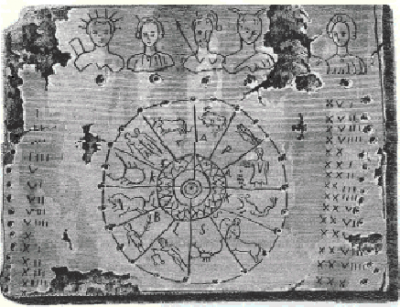Research in this area was prompted by the lack of comprehensive and systematic studies into the origins of the seven-day week and the process of its diffusion and standardization in the Roman Empire and the Near East.
Although the practice of dividing the days of the year into cycles of seven days and to name each of these days is generally considered as a universal habit that reaches far back into antiquity, before the early Roman Imperial period neither Greeks nor Romans nor, as it seems, any other ancient civilisation used to measure time in this way. Even the Biblical seven-day week does not appear to have been used for practical purposes much earlier than then.

Planetary week, Trajan’s Baths parapegma
Thereafter, in the course of the first centuries of our era, the seven-day week became increasingly widespread throughout the Roman Empire, as shown by a wealth of literary, epigraphic, and documentary sources. By the fourth century CE the habit of measuring time in cycles of seven days –either in the Judeo-Christian or in the planetary form– became general all across the Roman Empire.
Being widely shared by different groups (pagans, Jews, Christians) regardless of the variety of calendars that they might have been using (Julian, Alexandrian, lunar, etc.), the seven-day week played a significant role in unifying and standardizing time reckoning and calendars in antiquity.
In addition to investigating its origins and diffusion, our research in this area has also explored what meanings and functions were ascribed to the seven-day week by Jews, Christians, and pagans, as well as questions such as how standard was the reckoning of the seven-day week, whether it employed the same or similar weekday names or numbers in different places and periods and among different social groups, and how the week was reckoned in practice.
As part of this project, we have carried out a comprehensive analysis of Greek and Latin sources coming from the territory encompassed by the Roman Empire and dating from the early imperial to the late antique period. We have arranged these sources in the form of a database using a programme called NVivo, which allowed us not only to store this material but also to run multiple searches, classify, sort, arrange, and examine relationships in the data that forms our corpus.
Our main researcher in this area is Dr Ilaria Bultrighini.
 Close
Close

